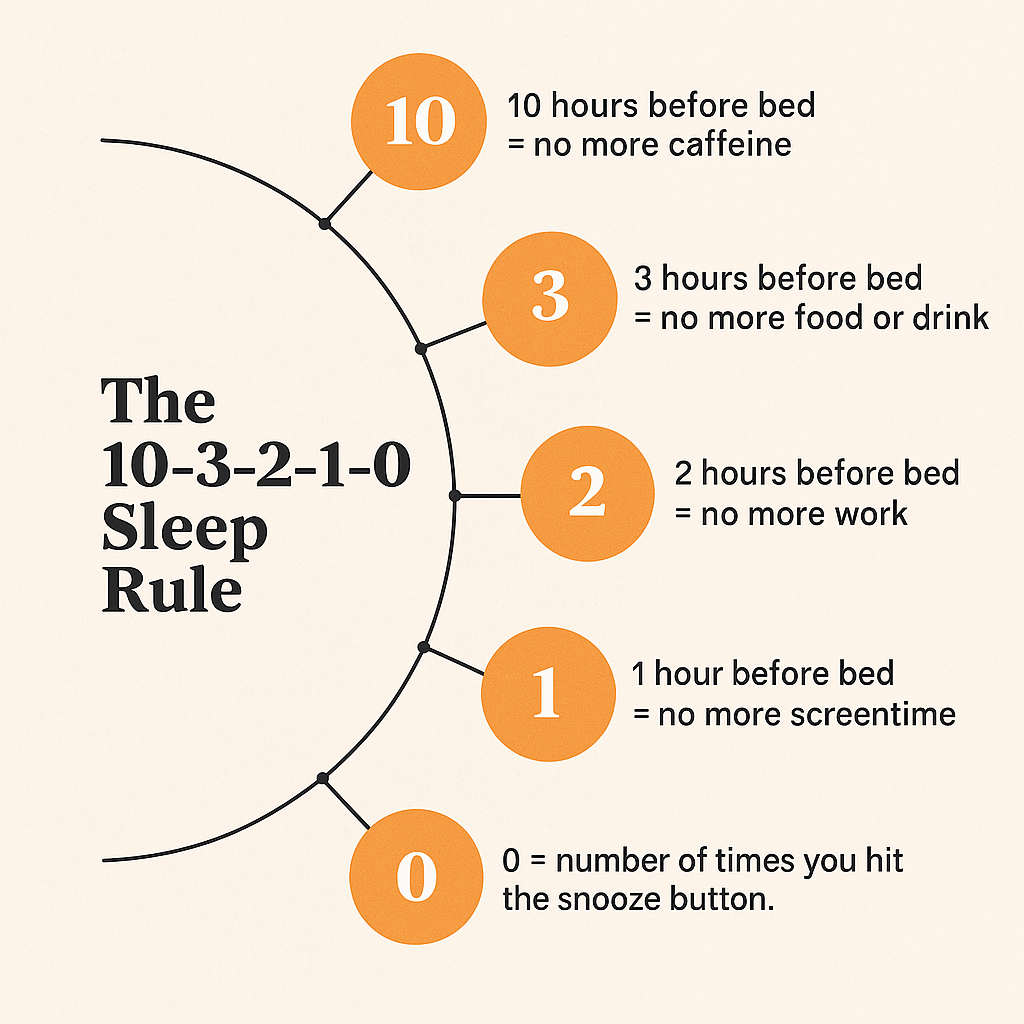
Struggling to fall asleep or stay asleep? The solution might not be what you do at night, but what you do hours before. Your daily habits have a massive impact on your sleep quality. The 10-3-2-1-0 rule is a simple, memorable formula created by sleep experts to guide your day and prime your body for deep, uninterrupted rest. It breaks down into five easy-to-follow rules based on the hours before your head hits the pillow.
10 Hours Before Bed: No More Caffeine
The Rule: Cut off all caffeine consumption 10 hours before you intend to sleep.
The Science: Caffeine has a half-life of about 5-6 hours, meaning it takes that long for your body to eliminate half of it. It can take 10+ hours to fully clear your system. Even if you don’t “feel” the caffeine, it can still be disrupting your sleep architecture, preventing you from reaching deep, restorative sleep stages.
Action: If your bedtime is 10 PM, your last coffee, tea, soda, or energy drink should be no later than 12 PM noon.
3 Hours Before Bed: No More Food or Alcohol
The Rule: Stop eating large meals and consuming alcohol 3 hours before bed.
The Science: Digestion is an active process that can interfere with your body’s wind-down routine. Lying down with a full stomach can also cause acid reflux. While alcohol might make you feel drowsy initially, it metabolizes into chemicals that disrupt the second half of your sleep cycle, leading to frequent awakenings and non-restorative sleep.
Action: Finish dinner by 7 PM for a 10 PM bedtime. If you’re hungry later, a very small, light snack is okay.
2 Hours Before Bed: No More Work
The Rule: Stop all work—including answering emails and stressful conversations—2 hours before bed.
The Science: Work-related activities stimulate your brain and spike cortisol (the stress hormone), which is the direct opposite of the calm, relaxed state you need for sleep. This gives your mind time to decompress and transition out of “productivity mode.”
Action: Set a hard stop for work at 8 PM. Use this time to relax, not to tackle your to-do list.
1 Hour Before Bed: No More Screens
The Rule: Power down all electronic devices (phones, tablets, TVs, laptops) 1 hour before bed.
The Science: Screens emit blue light, which tricks your brain into thinking it’s still daytime, suppressing the production of melatonin. Furthermore, the content you consume—scrolling social media, watching news, reading emails—is often mentally stimulating.
Action: At 9 PM, put your phone on charge in another room. Read a physical book, listen to calm music, take a bath, or talk with your partner.
0: The Number of Times You Hit Snooze
The Rule: When your alarm goes off, get up. Zero snoozes.
The Science: Hitting snooze fragments those last precious minutes of sleep into low-quality, interrupted chunks. This creates sleep inertia—that groggy, disoriented feeling that can last for hours. Getting up at the same time every day (even on weekends) is the most powerful way to regulate your circadian rhythm.
Action: Place your alarm clock across the room so you have to get out of bed to turn it off.
You don’t have to implement all five rules perfectly on day one. Choose one or two to start with, and gradually incorporate the others. This formula provides a clear, actionable framework to structure your evening for sleep success, helping you wake up feeling truly refreshed and ready to rise.
